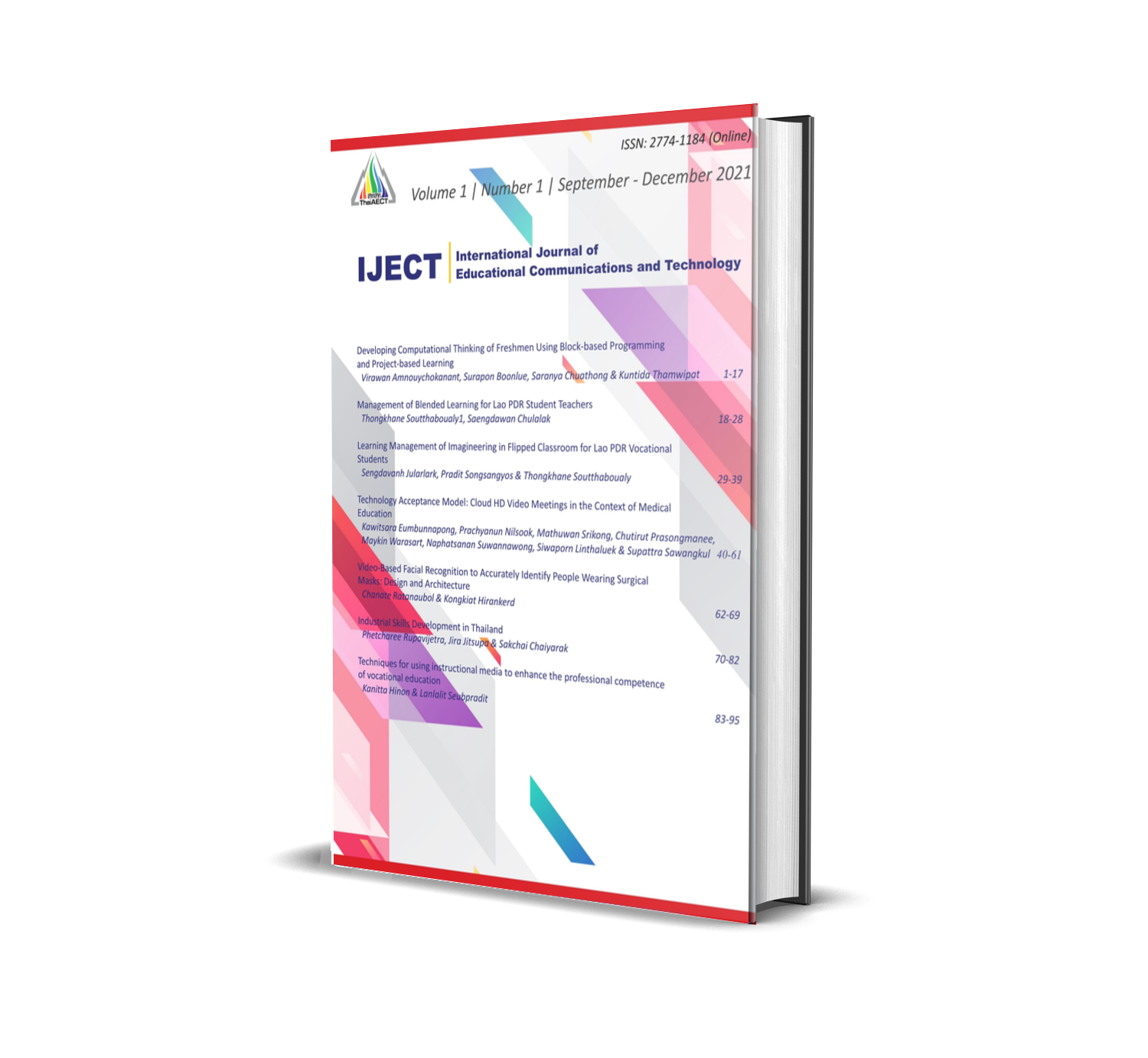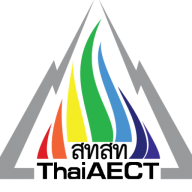Guidelines for Using Instructional Materials of Vocational Education in Thailand during COVID-19
Keywords:
On-site, On-Air, Online, On-demand, Thai Vocational EducationAbstract
The This information on the guidelines for manipulating of online learning materials of Thai vocational education during school closures due to COVID-19 has been based on document-analysis research techniques. The results showed that during the closure of academic institutions, the learning system continued. It allows vocational schools to maintain a policy of managing learning in the similar direction. Teaching and learning at the Vocational Education Institutes of Thailand use On-Site, On-Air, Online and On-demand learning methods. The Ministry of Education has included on-hand learning methods together with online learning management with various methods including Synchronous, Asynchronous, Hybrid Learning & Blended Learning. While on-site teaching uses Project-based Learning, STEM and STEAM management. As for On-Air teaching and learning, R-radio and TV Thai-com are primarily used. On-demand, it's an informal study via YouTube, R-Channel. On-hand will deliver books for learners to learn by themselves at home. These policies and actions make it possible for vocational education institutions to continuously provide teaching in the Covid-19 situation.
References
Arpaci, I. (2019). A hybrid modeling approach for predicting the educational use of mobile cloud computing services in higher education. Computers in Human Behavior, 90(January 2018), 181–187. https://doi.org/10.1016/j.chb.2018.09.005
Chatwattana, P., & Nilsook, P. (2017). A web-based learning system using project-based learning and Imagineering. International Journal of Emerging Technologies in Learning, 12(5). https://doi.org/10.3991/ijet.v12i05.6344
Gulatee, Y., & Nilsook, P. (2016). MOOC‟s Barriers and Enables. International Journal of Information and Education Technology, 6(10), 826–830. https://doi.org/10.7763/IJIET.2016.V6.800
Hinon, K. (n.d.). Development of Lesson Plans for Practicing Electrical Installation Professional Experience with Competency- Based Training System in Building Electricians, (September 2019), 25–28.
Hinon, K., Nilsook, P., & Wannapiroon, P. (2020). Development of Lesson Plans for Practicing Electrical Installation Professional Experience with Competency-Based Training System in Building Electricians. Advances in Intelligent Systems and Computing (Vol. 1135 AISC). Springer International Publishing. https://doi.org/10.1007/978-3-030-40271-6_23
ILO-UNESCO-WBG. (2020). ILO-UNESCO-WBG Joint Survey on Tech- nical and Vocational Education and Training ( TVET ) and Skills Development during the time of COVID-19. ILO-UNESCO-WBG Joint Survey.
International Labour Organization and World Bank. (2021). Skills development in the time of COVID-19 : Geneva: International Labour Organization and World Bank.
Kanoknitanunt, P., Nilsook, P., & Wannapiroon, P. (2021). Imagineering Learning With Logical Problem Solving. Journal of Education and Learning, 10(3), 112–121. https://doi.org/10.5539/jel.v10n3p112
Khamkaew, S. (2021). The Effects of Online Learning during the Outbreak of Coronavirus Disease 2019 ( COVID-19 ) towards Grade 10- 12 Thai Students ’ Opinions. Journal of World Englishes and Educational Practices, 3(1), 53–62. https://doi.org/10.32996/jweep
Khumphai, T., Chengwatthanaphong, S., Rattanaudum, P., Bouaroon, S., & Somporn Pandam. (2021). Online Learning Management Model of Industrial Student’s Program in the New Normal During COVID-19 Pandemic. Journal of MCU Nakhondhat, 8(3), 393–407.
Kittiviriyakarn, S., Nilsook, P., & Wannapiroon, P. (2020). The Professional Experience Transfer Model from the Prediction of an Intelligent Portfolio Using Service Agents. International Journal of Information and Education Technology, 10(6), 428–434. https://doi.org/10.18178/ijiet.2020.10.6.1402
Kummanee, J., Nilsook, P., & Wannapiroon, P. (2020). Digital learning ecosystem involving steam gamification for a vocational innovator.
International Journal of Information and Education Technology, 10(7), 533–539. https://doi.org/10.18178/ijiet.2020.10.7.1420
Nilsook, P., Armstrong, L., Taechatanasat, P., & Ranjeet, T. (2014). 9th Conference of the Asian Federation for Information Technology in Agriculture. In Web-Based Training in eAgriculture for Agricultural College (pp. 360–370). Perth, Western Australia.
Nilsook, P., Chatwattana, P., & Seechaliao, T. (2021). The Project-based Learning Management Process for Vocational and Technical Education. Higher Education Studies, 11(2), 20–29. https://doi.org/10.5539/hes.v11n2p20
Paweenawat, S.-W., & Liao, L. (2021). A ‘She-session’? The Impact of the Global Economy on the Labour Market in Thailand. In ERIA Discussion Paper Series (Vol. June, pp. 179–195). Globalisation and Work in Asia. https://doi.org/10.1016/B978-1-84334-217-5.50008-3
Phraratsutaporn, & Klomkul, L. (2021). Technological Innovation for Online Learning during the Situation of COVID-19 Pandemic in Thailand. Psychology and Education, 58(1), 1578–1584.
Poonsawad, P., & Lawthong, N. (2021). Assessing Alignment between Thai and International English Language Learning on Massive Open Online Course (MOOC) Using Porter’s Alignment Index. Journal of Education Khon Kaen University, 44(3), 93–110. https://doi.org/10.14456/edkkuj.2020.x
Puriwat, W., & Tripopsakul, S. (2020). Preparing for industry 4.0-will youths have enough essential skills?: An evidence from Thailand. International Journal of Instruction, 13(3), 89–104. https://doi.org/10.29333/iji.2020.1337a
Puriwat, W., & Tripopsakul, S. (2021). The Impact of e-Learning Quality on Student Satisfaction and Continuance Usage Intentions during COVID-19. International Journal of Information and Education Technology, 11(8), 368–374. https://doi.org/10.18178/ijiet.2021.11.8.1536
Rujira, T., Nilsook, P., & Wannapiroon, P. (2020). Synthesis of vocational education college transformation process toward high-performance digital organization. International Journal of Information and Education Technology, 10(11). https://doi.org/10.18178/ijiet.2020.10.11.1466
Rujira, Thanasam, Nilsook, P., & Wannapiroon, P. (2021). Vocational Education Digital Enterprise Architecture Framework (VEDEAF). In 2021 9th International Conference on Information and Education Technology, ICIET 2021 (pp. 63–67). https://doi.org/10.1109/ICIET51873.2021.9419576
Schleicher, A., & El Iza Mohamedou. (2021). Implications of the COVID-19 pandemic for Vocational Education and Training. the Organisation for Economic Co-operation and Development (OECD).
Suksatan, S., Tungkunanan, P., & Choomnoom, S. (2018). Thai vocational college education monitoring and evaluation: A confirmatory factor analysis. Asia-Pacific Social Science Review, 18(1), 157–167.
Taechatanasat, P., Armstrong, L., & Nilsook, P. (2017). Designing a multilanguage blended learning system for Thai agricultural science students. In Proceedings of 2016 IEEE International Conference on Teaching, Assessment and Learning for Engineering, TALE 2016. https://doi.org/10.1109/TALE.2016.7851783
Theeraroungchaisri, A., & Khlaisang, J. (2019). Thai MOOC sustainability: Alternative credentials for digital age learners. In Proceedings of EMOOCs 2019 (pp. 203–209).
UNESCO-UNEVOC. (2014). UNESCO-UNEVOC in Action: Biennial Report 2012-2013. UNESCO-UNEVOC International Centre for Technical and Vocational Education and Training. Bonn, Germanny. Retrieved from https://search.ebscohost.com/login.aspx?direct=true&db=eric&AN=ED560495&site=ehost-live
United Nations Thailand. (2020). Social Impact Covid-19 in Thailand. Oxford: Oxford Policy Management.
Vandeweyer, M., Espinoza, R., Reznikova, L., Lee, M., & Herabat, T. (2021). Thailand’s education system and skills imbalances: Assessment and policy recommendations. OECD Economics Department. Organisation for Economic Co-operation and Development. https://doi.org/10.1787/b79addb6-en
Vanpetch, Y., & Sattayathamrongthian, M. (2020). The challenge and opportunities of thailand education due to the covid-19 pandemic: Case study of Nakhon Pathom, Thailand. In E3S Web of Conferences (Vol. 210). https://doi.org/10.1051/e3sconf/202021018058
Wannapiroon, P., Nilsook, P., Jitsupa, J., & Chaiyarak, S. (2022). Digital Competences of Vocational Instructors with Synchronous Online Learning in Next Normal Education. International Journal of Instruction, 15(1), 293–310.
Wannapiroon, P., Nilsook, P., Techakosit, S., & Kamkhuntod, S. (2021). STEM Literacy of Students in Vocational Education. International Journal of Technology in Education and Science, 5(4), 527–549. https://doi.org/https://doi.org/10.46328/ijtes.253
Wanotayapitak, S., Saraubon, K., & Nilsook, P. (2019). Process design of cooperative education management system by cloud-based blockchain E-Portfolio. International Journal of Online and Biomedical Engineering, 15(8). https://doi.org/10.3991/ijoe.v15i08.10374
Yeap, C. F., Suhaimi, N., & Nasir, M. K. M. (2021). Issues , Challenges , and Suggestions for Empowering Technical Vocational Education and Training Education during the COVID-19 Pandemic in Malaysia. Creative Education, 12, 1818–1839. https://doi.org/10.4236/ce.2021.128138
Zhu, M., & Bonk, C. J. (2019). Designing MOOCS to facilitate participant self-monitoring for self-directed learning. Online Learning Journal, 23(4), 106–134. https://doi.org/10.24059/olj.v23i4.2037
Downloads
Published
How to Cite
Issue
Section
License

This work is licensed under a Creative Commons Attribution-NonCommercial-NoDerivatives 4.0 International License.







